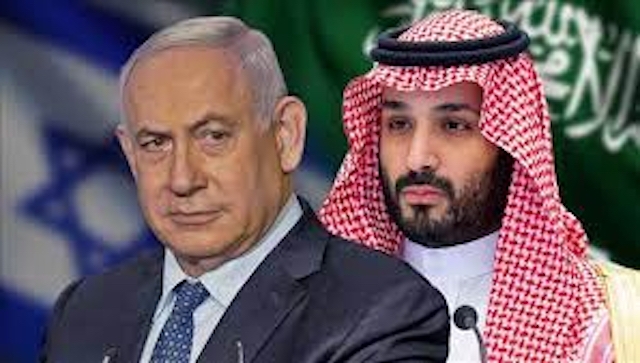As normalization talks between Israel and Saudi Arabia loom on the horizon, a strategic tapestry appears to be unfolding. At the core of this geopolitical quilt is the United States, particularly under the auspices of President Biden, who seems to be the catalyst behind these initiatives. Washington has reportedly secured commitments from the Palestinian Authority to neither denounce nor undermine these significant dialogues. But what does this mean for Israel, and how does this setup bode for future relations in the Middle East?
U.S. Diplomatic Maneuvers: A Two-Pronged Strategy
The Biden Administration appears to be employing a two-pronged diplomatic strategy. A U.S. State Department source disclosed that the administration has not only been facilitating talks between Saudi Arabia and Israel but is also putting considerable effort into creating a financial and political package designed to appease Palestinian apprehensions.
This is in marked contrast to the reactions elicited by the 2020 Abraham Accords, which established ties between Israel, the United Arab Emirates, and Bahrain but did not include significant provisions for the Palestinians. A second, anonymous U.S. official indicated that the proposed package is intended to be substantial enough to significantly uplift the struggling Palestinian economy.
The visit by White House Middle East czar Brett McGurk and Assistant Secretary of State for Near Eastern Affairs Barbara Leaf will come just over a month after US National Security Adviser Jake Sullivan visited Saudi Arabia with the same objective… (2/4)
— Jacob Magid (@JacobMagid) September 3, 2023
Palestinian Authority: Between a Rock and a Hard Place
The Palestinians find themselves with limited options but a unique opportunity. An anonymous Palestinian Authority official in Ramallah articulated this sentiment by stating, "Given Saudi Arabia's formidable political clout and resource strength, we aspire to be part of these U.S.-led negotiations." It seems the Palestinian Authority has shifted its stance, making less ambitious demands than before, like requesting Israel to relinquish control over specified West Bank areas and dismantle some settlements. These newfound positions indicate a newfound pragmatism that may open the door for more focused dialogues with Israel.
Biden admin author of PLO ‘demands’:
— R✡︎d Sales 🏹 (@razingarizona) August 31, 2023
“In recent months, Palestinian Authority emissaries have provided U.S. and Saudi officials with specific ideas on what steps they would like to see as part of any Israel-Saudi agreement, the officials said.”#AllyAbusehttps://t.co/a0uyte89Q8
A Crossroads for the Kingdom and the Jewish State
But the stage is not solely set for the Palestinians to make or break these historic talks. Saudi Arabia itself faces strategic considerations. Political analyst Nour Odeh cautions that Riyadh might prioritize financial over political incentives for the Palestinians, raising questions about the wisdom of normalization given the current Israeli government. However, Odeh's skepticism doesn't necessarily reflect the broader opportunities presented by these talks, especially for Israel.
Israeli Anticipations and Strategic Concerns
From an Israeli perspective, these talks, if successful, could be a seminal moment, potentially even rivaling the impact of the Camp David Accords of 1978. Dr. Jonathan Rynhold, Head of Political Studies at Bar-Ilan University, offered insights on this point to the Middle East centered "Media Line" news agency. He argued that while the current Israeli government might be resistant to significant concessions, the Israeli public would likely support a deal that retains Israeli security and military control over disputed territories.
Dr. Rynhold also advised that the Palestinians should clearly articulate their terms to the Israeli government, hinting that this could put the current Israeli coalition in a predicament. This would especially be the case as younger Democrats, who are generally more sympathetic toward the Palestinians but still see the two-state solution as an "article of faith," gain influence in Washington.
According to @BarakRavid “Senior Biden adviser heading to Saudi Arabia to talk mega-deal with Palestinians” yet the same official has failed to stop PKK/SDF from killing the Arabs in NE Syria & ignored the Arab demands . So How can he promise the Palestinian that he can deliver…
— Bassam Barabandi بسام بربندي (@BASSAMVA) September 4, 2023
The Stakes for Regional Leaders
Observers concur that the success of such normalization talks could greatly benefit Israel's long-serving Prime Minister and would be a game-changer for regional stability. Jordanian political analyst Osama Al Sharif aptly summarizes the stakes by stating that the Palestinians have no other alternative than to try and negotiate a favorable deal, as normalization appears inevitable.
As the U.S., Saudi Arabia, and Israel stand on the threshold of these potentially historic talks, all eyes are on how this geopolitical choreography will unfold. With various players making carefully calculated moves, the coming months could be transformative for Middle Eastern diplomacy and beyond.


